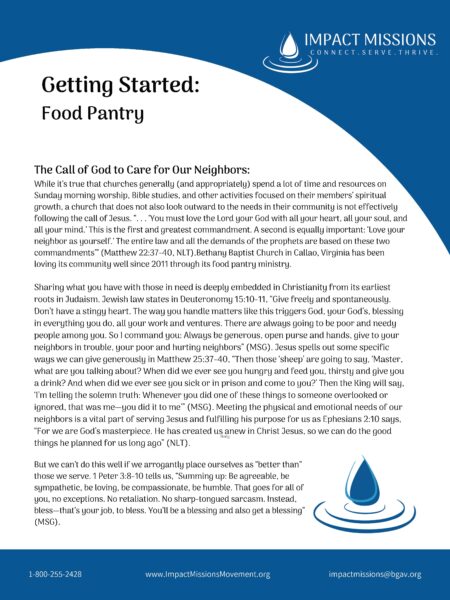– Written by Kristen Curtis
While it’s true that churches generally (and appropriately) spend a lot of time and resources on Sunday morning worship, Bible studies, and other activities focused on their members’ spiritual growth, a church that does not also look outward to the needs in their community is not effectively following the call of Jesus. “. . . ‘You must love the Lord your God with all your heart, all your soul, and all your mind.’ This is the first and greatest commandment. A second is equally important: ‘Love your neighbor as yourself.’ The entire law and all the demands of the prophets are based on these two commandments’” (Matthew 22:37-40, NLT). Bethany Baptist Church in Callao, Virginia has been loving its community well since 2011 through its food pantry ministry.
But we can’t do this well if we arrogantly place ourselves as “better than” those we serve. 1 Peter 3:8-10 tells us, “Summing up: Be agreeable, be sympathetic, be loving, be compassionate, be humble. That goes for all of you, no exceptions. No retaliation. No sharp-tongued sarcasm. Instead, bless—that’s your job, to bless. You’ll be a blessing and also get a blessing” (MSG).
Jennifer English, who heads up the food pantry ministry at Bethany Baptist Church in Callao, Virginia, says that, first and foremost, you need to be called to a ministry like this. “When God calls you to a ministry, you never know who He will bring alongside of you. But you quickly learn that if you lead with the mission, He will provide everything else: The people, the money, and any other resources you may need.” For her, that calling began when she attended a BGAV Hunger Dialogue that opened her eyes to a need that she knew was bigger than she could meet and a recognition that a one-time gift of food at special times of the year was not enough to fulfill the needs she was beginning to see around her. Then at the BGAV annual meeting in 2009, God used the keynote speaker’s phrase “Get off your donkey and do something” to encourage her to speak to her local WMU executive committee about what she was thinking and feeling about meeting hunger needs in their community in a more consistent way. That conversation began a five-month-long process for a team of ten people, planning and connecting with partners to accomplish what they could not do on their own. As part of this planning, they connected with what was then called the Northern Neck Food Bank (now the Healthy Harvest Food Bank (HHFB)) which, at the time, allowed the church to purchase food for seventeen cents a pound. Over the months, the group got a little “bottle-necked” thinking and talking about all the “what ifs” and the potential processes and procedures they needed, until one member of the group encouraged them to “just try it.” English says she had to learn that “if you are waiting for certainty before you determine what’s next then you are waiting too long!” And so, the group stepped out in faith and opened their doors for the first of what would become monthly invitations to their neighbors in need of food to be welcomed in and loved in a very practical way. That first week, they served 69 families and gave away all the food they had to distribute (down to one last package of chicken left behind in the freezer when someone came late and asked simply for some meat for her family).
One thing that makes this food pantry unique is (with the exception of COVID restrictions in 2020 and 2021 that required drive-through distribution and uniform food packages), guests of the pantry are invited inside to a comfortable space as they wait their turn. Rather than simply being handed a “one size fits all” box of food, each recipient is given a menu of the month’s options and encouraged to choose the food items they will actually eat and the produce they would like to prepare for themselves. This kind of distribution helps the church be good stewards of the food they have as less is wasted when recipients aren’t required to take food they don’t like or won’t eat, and amounts can be tailored to the needs of different size households. This process respects the patrons as unique individuals with unique tastes and needs, and it provides an opportunity for personal relationships to grow as regular participants engage in conversation and personal stories of life with volunteers, catching up on the happenings of one another’s’ lives.
Learn more about how you can start a food pantry that empowers the neighbors you serve in the resource below.

